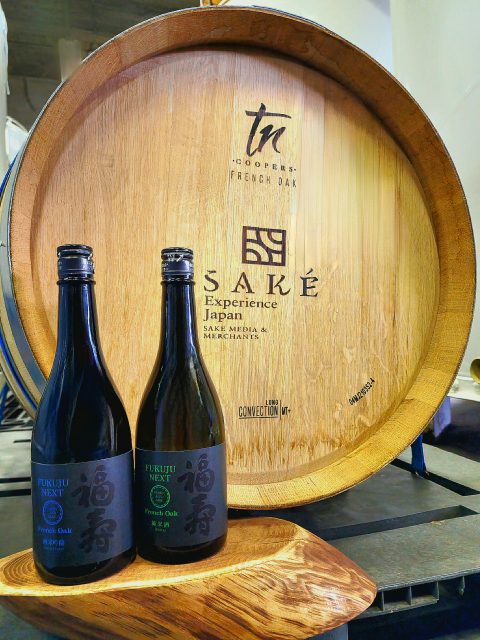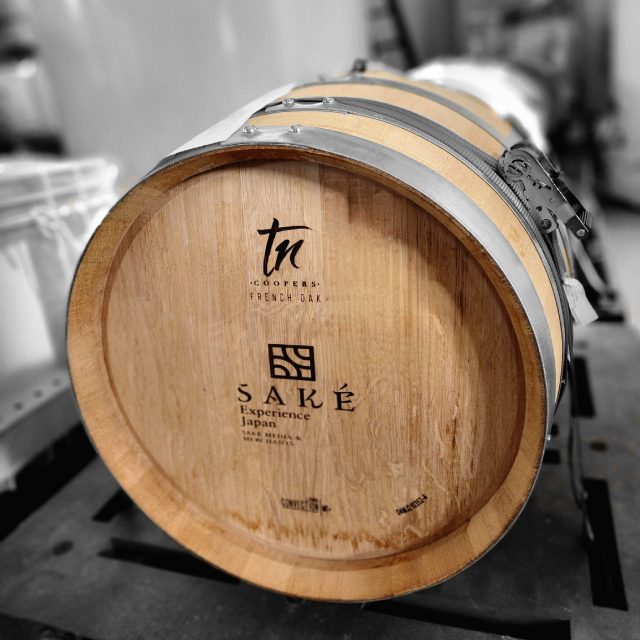New barrel-aged sake Fukuju Next’ launches this year
Following the success of Fukuju EcoZero winning the Renewable Energy Award in The Drinks Business‘ Green Awards 2022, comes Fukuju’s new barrel-aged sake for 2023 – Fukuju Next.

The new release, which pursues both economic and environmental values, will be aged in new oak barrels, which is rare for sake and adds to the product’s distinctly smooth flavour profile.
Fukuju Brewery, which pursues sustainable sake production, has positioned this product as a breakthrough in the conventions of the sake industry, hence the product name Fukuju Next.
In Japan and particularly in Nada, the area where Fukuju Brewery is located, sake was historically fermented and transported in cedar vats, making the cedar aroma a core characteristic of Nada’s sake. However, with the increasing popularity of Ginjo sake, which has a fruity aroma, the market for sake with a cedar aroma has shrunk. Therefore, the decision to shift to oak makes perfect business sense.
Using oak barrel ageing methods, almost unheard of in the sake industry, Fukuju has created a product that expresses the ageing value in a new taste domain, while retaining a pleasant sake flavour.

The project to create Fukuju Next has been in development for more than a year, while the Toji (chief brewer) looked for the ideal oak wood with the ideal level of toast.
Fukuju Brewery revealed that nine types of wood were tested, including two different types of oak – the American oak Quercus Alba which imparts vanilla aromas, and the French oak Quercus Petraea which adds complexity and elegance. The ageing period was controlled, and the changes were checked every month, resulting in the development of six sake variations under the name “Fukuju Next”.
The new sakes in the portfolio include Fukuju Next Junmai Ginjo French Oak, with an aroma of apple puree, rich fruity flavour, and pleasant acidity; Fukuju Next Junmai Ginjo American Oak, which has citrus and creamy notes in the aroma, and a soft velvety texture; Fukuju Next Junmai French Oak, with a smoky aroma and firm acidity, elegant with nuances of lychee honey in the finish; Fukuju Next Junmai American Oak, which has an aroma of lightly-roasted sweet potatoes, rich fruitiness, and condensed acidity. The new additions: Fukuju Next Junmai Ginjo Barrel Aged Blended Sake (a blend of Junmai Ginjo, French oak aged Junmai Ginjo, and American oak aged Junmai Ginjo)is dry with an aroma of marron glace and nuts, it is both complex and elegant; Fukuju Next Junmai Barrel Aged Blended Sake (a blend of Junmai, French oak aged Junmai, and American oak aged Junmai) has a chestnut-like aroma with many complex notes of almond and citrus, it is well-rounded with a long, lingering finish and a pleasant orange peel-like bitterness.
Selecting the type of barrel, the level of toast, and deciding the ageing period may be natural steps in categories such as wine and whisky, but it is an approach almost unprecedented in the sake industry. Fukuju Brewery has identified how these steps are determining the quality of sake, and the accumulated know-how will lead to the development of new products with even greater originality in the future. The adoption of Mizunara barrels is also being considered.
Fukuju is a sake brewery with a history of over 270 years, founded in 1751 in the district of Nada, Kobe, the most famous sake brewing area in Japan. The brand Fukuju is known both in Japan and abroad, especially as the sake served at the Nobel Prize official events. In recent years, Fukuju Brewery has gained recognition in the sake industry for its sustainability. The company’s sustainable sake production is based on the pursuit of both environmental value (reduction of environmental impact) and economic value (increase in sales and cost reduction). In the pursuit of environmental value, last year the company became the first in the world to achieve carbon neutrality in both Scope 1 (direct greenhouse gas emissions by the business itself) and Scope 2 (indirect emissions from the use of electricity, heat, and steam supplied by other companies).
All electricity used in Fukuju Brewery comes from 100% renewable energy, and Fukuju Next is aged in natural conditions in a warehouse, without artificial temperature control. All French oak barrels are made from PEFC-certified oak, and American oak barrels are mainly made from FSC-certified oak.
Released in limited quantity, Fukuju Next has already attracted the attention of leading Japanese food chains, and there are plans underway to expand in overseas markets, like Singapore and the US.
Sake exports are growing rapidly: after surpassing 10 billion yen in 2013, they were forecast to exceed 40 billion yen in 2021, less than a decade later. The CAGR over the past 10 years has been 18%, making it one of the alcohol industry’s fastest-growing categories. By region, Asia, Oceania, and North America account for about 90% of the sake export market, and the European market is expected to expand significantly in the future.
Fukuju’s exports in FY2022 were up 150% from the previous year’s levels. The company will also exhibit at the ProWein Dusseldorf in March 2023, as part of the stand organised by the Sake and Shochu Makers Association, to further boost its presence in Europe.
Interested importers and distributors can visit the booth, which can be found in Hall14, stand 30 and to organise tastings at ProWein Dusseldorf, contact Cinzia Mesolella on: mesolella@shushinkan.co.jp
Related news
What Portugal can do for the UK wine trade
The first 0.5% Bordeaux red hits the market
VIK 2022: ‘the beginning of a journey toward self-sufficiency’
